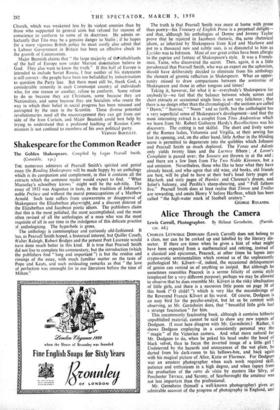Shakespeare for the Common Reader The Golden Shakespeare. Compiled by
Logan Pearsall Smith. (Constable. 1ss.) THE numerous admirers of Pearsall Smith's spirited and genial essay On Reading Shakespeare will be made happy by an anthology which is its companion and complement, in that it contains all the extracts which the common reader would expect to find. "What Macaulay's schoolboy knows" might well be the sub-title. The essay of 1933 was Augustan in taste, in the tradition of Johnson's noble Preface and without the moral preoccupations of a Matthew Arnold. Such taste suffers from unawareness or disapproval of Shakespeare the Elizabethan playwright, And a discreet distrust of the Elizabethan and Jacobean poetic idiom. The publishers claim that this is the most polished, the most accomplished, and the most often revised of all the anthologies of a man who was the most mquisite of all in our time in the indulgence of this delicate practice A anthologising. The hyperbole is gross.
The anthology is commonplace and curiously old-fashioned. It has, as Pearsall Smith hoped, a historical interest, but Quiller Couch, Walter Raleigh, Robert Bridges and the present Poet Laureate would have done much better in this kind. It is true that Pearsall Smith did not live to complete his commentary, but the introduction (which the publishers find "long and important ") is but the residue and rinsings of the essay, with much familiar matter on the taste of Pope and Keats, and such misleading remarks as that "the love of perfection was unsought for in our literature before the time of Milton."
The truth is that Pearsall Smith was more at home with prose than poetry—his Treasury of English Prose.is a perpetual delight— and that, .although his anthologies- of Donne and Jeremy Taylor prove that he rejoiced in Jacobean rhetoric, thq, same rhetorical idiom, as inherited by Shakespeare from Kyd and Marlowe and put to a thousand new and subtle uses, is as distasteful to him as Lycidas was to Johnson. Most of our great critics have been allergic to the caprice and fantasy of Shakespeare's style.. It was a French- man, Taine, who discovered the secret. Then, again, it is a little paradoxical that Pearsall Smith, who was an expert on the aphorism, should have deliberately decided to eliminate from his anthology the element of gnomic reflection in Shakespeare. What an oppor- tunity missed to draw comparisons between the sententiae of Shakespeare and those in other tongues and times!
Taking it, however, for what it is—everybody's Shakespeare (or anybody's)—we feel that the balance between whole scenes and short extracts or occasional single lines is not very felicitous ; that there is no design other than the chronological—the sections are called "Dawn," "Sunrise," " Noon " and so forth, but the antholqgist has a very superficial sense of Shakespeare's development—and that the most interesting extract is a couplet from Titus Andronicus which we learn from Mr. Robert Gathome Hardy's Recollections was his discovery. The cutting is not skilful. The short and lively scene of the Roman ladies, Volumnia and Virgilia, at their sewing has lost its opening, and, on the other hand, little Arthur in the blinding scene is permitted to degenerate into the quibbles which Johnson and Pearsall Smith so much deplored. The Venus and Adonis only yields twenty lines and the Lucrece fifteen ; A Lover's Complaint is passed over; the Sonnets are thrown in at the end ; and there are a few lines from The Two Noble Kinsmen, but a sad omission. Nevertheless, those who like to hear what they have already heard, and who agree that old wine, old books, old friends are best, will be glad to have at their bed's head forty pages of Macbeth, and sixty pages of Hamlet, and Clarence's dream, and Juliet's balcony, and Perdita's sheep-shearing, and "Full fathom five." Pearsall Smith does at least realise that Timon and Troilus are rewarding, and omits Henry V before Harfleur, which has been called "the high-water mark of football oratory."
GEORGE RYLANDS.


































 Previous page
Previous page